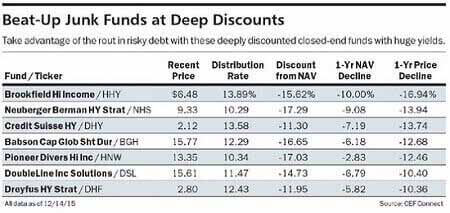Last week, Barron's recommended that investors start buying beaten-up junk bond funds that are trading at big discounts and yielding 10% or more.
Their advice: "Take advantage of this rout in risky debt."
Not so fast!
It is certainly true that a number of closed-end junk bond funds are trading at big discounts and also paying big dividends. Part of the reason for this is that the already weak market in junk bonds was spooked by the liquidation of the Third Avenue Focused Credit Fund (MUTF: TFCVX), a junk bond mutual fund. (That was huge news. Here's my take if you missed it.) This led to an even sharper sell-off in junk bonds that pushed the prices of the bonds themselves, as well as many closed-end funds that own them, to prices that may not reflect their intrinsic value.
 But there's a big problem with this Barron's advice.
But there's a big problem with this Barron's advice.
The problem is that terrible market conditions, artificially low interest rates, and a weak U.S. economy make it difficult to determine precisely what the intrinsic value of the bonds themselves or the funds that hold them really is.
I think the high-yield market is beginning an extended period of losses that will continue through at least 2018. Closed-end funds certainly pay high dividends but are unlikely to see much improvement in their net asset values (NAVs), since bond prices are unlikely to begin improving until the market bottoms in 2017 or 2018.
Furthermore, the default cycle is likely to pick up considerably in 2016 and the next two years, which means that many of the bonds held by these funds will stop paying interest. This will impair the dividend-paying ability of these funds. It may not happen immediately, but by late 2016 and 2017, it could become a serious problem leading to NAV erosion and dividend cuts.
The dynamic of the high-yield bond market is as follows...
Many companies are overleveraged and unable to reduce debt. Their overleveraged status has been disguised by the low interest rates at which they have been able to borrow courtesy of the Fed's zero-interest-rate policy. The crash in the lower tier of the high-yield bond market that began in mid-2014 has now increased the yield on these companies' bonds to high double-digit levels, which means that their cost of capital is prohibitively high. When their bonds and bank loans mature over the next few years (2017-2020), they will not be able to refinance their debts and will have to file for bankruptcy or enter a consensual restructuring with their bondholders.
Many companies' bonds and bank loans do not mature until after 2020, so there is a chance that defaults will be delayed. But if the economy continues to struggle, companies in sectors like energy, commodities, mining and metals, retail, and others will struggle and default. They will not be able to borrow additional money any longer and will default. The capital markets are effectively closed to these companies for the first time since the financial crisis.
But now that the Fed is tightening and investors are growing nervous about risk, the "extend and pretend" game is up. That is likely to be bad for high-yield bond funds.
Right now, the following funds are trading at deep discounts:

With double-digit NAV discounts and dividends, these may look attractive at the moment. A year from now, however, they likely won't look nearly as good.
Sorry, Barron's, but the high-yield bond rout is just beginning.
[mmpazkzone name="in-story" network="9794" site="307044" id="137008" type="4"]
Follow us on Twitter @moneymorning or like us on Facebook.
Editor's Note: These markets may appear safe, but that makes them all the more dangerous, and you need to be prepared for whatever happens next. The best way to do that is with Michael Lewitt's Sure Money service. In Sure Money, Michael helps you see what's going up, what's going down, and how to profit. Sign up now by clicking here, and you'll get instant access to all of Michael's investing tips, recommendations, and specific instructions, including his new report, "Last Currency Standing: Why Now Is the Best Time to Buy Gold in Five Years."
About the Author
Prominent money manager. Has built top-ranked credit and hedge funds, managed billions for institutional and high-net-worth clients. 29-year career.



